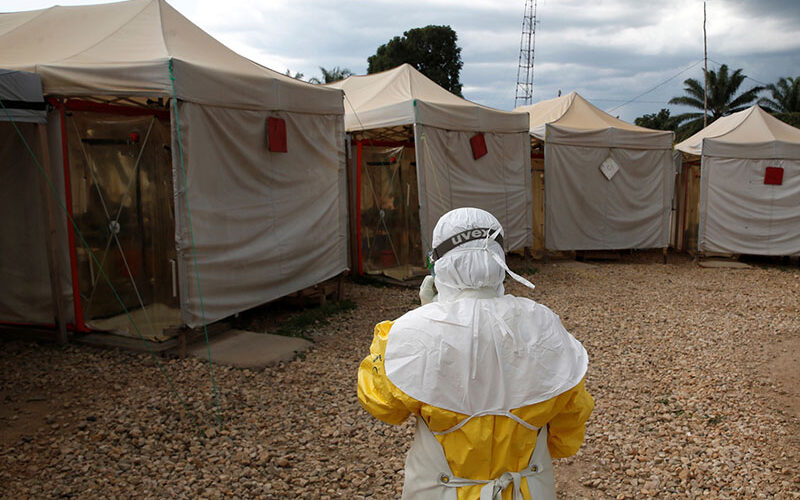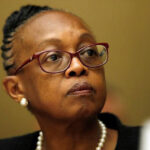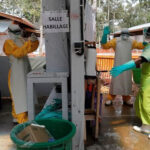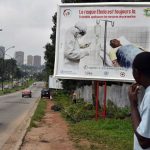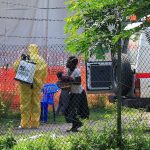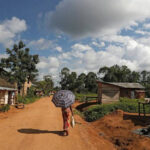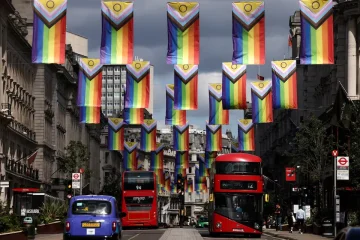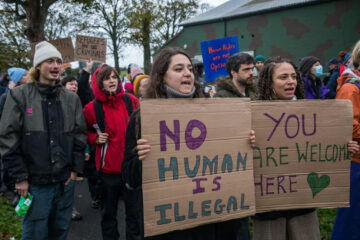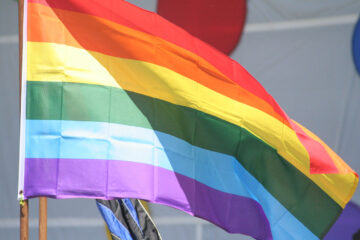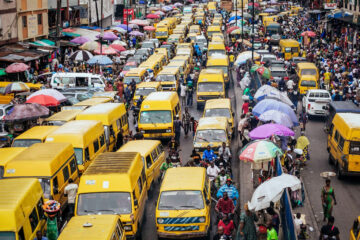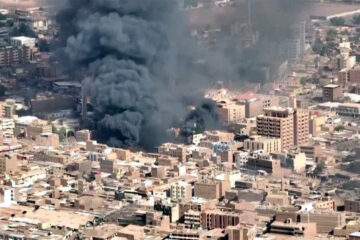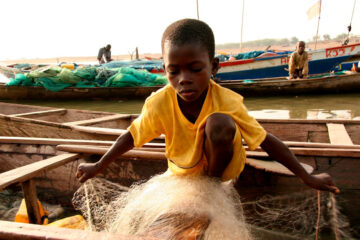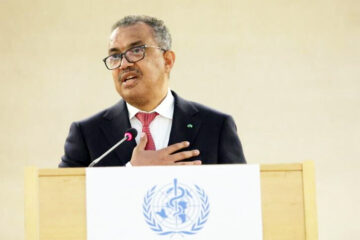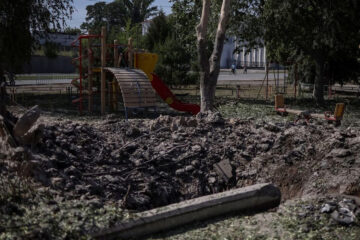PHILIP KLEINFELD and BEN PARKER
A review by leading aid agencies of Ebola operations in the Democratic Republic of Congo was not widely circulated to organisations involved in the response until several months after the epidemic was declared over, despite containing details of mismanagement, sexual abuse and exploitation, and coordination problems during the deadly outbreak.
The internal report from the Inter-Agency Standing Committee (IASC), a grouping of major UN agencies and NGOs, is one of the clearest acknowledgements – by humanitarian agencies themselves – of mistakes made during the Ebola crisis, which claimed more than 2,200 lives between August 2018 and June 2020.
Based on research conducted in Congo in January 2020, the findings of the 34-page review, obtained by The New Humanitarian, were supposed to improve the response to the outbreak whilst it was still underway, as well as inform future epidemic operations.
Jens Laerke, a spokesperson for the UN’s emergency aid coordination agency, OCHA, told TNH the report was shared in mid-February with the IASC chair and head of OCHA, Mark Lowcock, while some governments and a forum of NGOs and UN agencies in Congo, known as a Humanitarian Country Team, were briefed on its recommendations that same month. Laerke said it had been circulated to a “wider group” in November, “when we later realised that not everybody had the physical copy of the document”.
But three senior aid officials familiar with the process told TNH that the report did not reach the IASC “Principals” – the chief executives of the major UN agencies and other aid organisations that are the formal members of the committee – until 1 December.
Releasing the report almost six months after the end of the epidemic was “useless” since the review was intended to offer “course correctors” mid-operation, one of the officials said.
The report’s eventual release was due in part to persistent lobbying by NGOs which were involved in the outbreak, according to another official, all of whom requested anonymity given the sensitivity of the issue.
On 2 December, a group of more than 100 NGOs working in Congo shared the review in an email seen by TNH. “The finalisation and sharing of the report had been a recurring point of advocacy on the part of INGOs, whether at country level or at global level,” the email stated.
Multiple failures
The operational review – which Laerke said was an “informal peer review” rather than a formal audit or investigation – praises “highly dedicated staff” for working around the clock to try to stop the outbreak. It describes the quality of work as “remarkable” given challenging circumstances. But it also criticises response organisations for the way they used military escorts, paid security forces, struggled to coordinate between each other, and failed to put in place mechanisms to prevent sexual abuse and exploitation.
News of the report emerges after the publication in June of a months-long TNH investigation that showed how some Congolese civil servants and security forces had profited from the hundreds of millions of dollars of donor money spent containing the outbreak.
A separate joint investigation by TNH and the Thomson Reuters Foundation, published in October, revealed allegations that more than 50 women were sexually abused and exploited by international aid workers during the outbreak. Most cases involved workers from the World Health Organization – the main response agency supporting the government-led operation.
A senior worker from the world health body – which has now opened an independent investigation into the sexual abuse allegations – was one of six officials who were part of the team that carried out the review, the findings of which are based on interviews with 250 individuals, including community leaders and Ebola survivors.
Before mid-2019, the Ebola response was dominated by the WHO, which was under “huge pressure” from donors to display its improved emergency response capacity after being criticised for its slow reaction to the West African Ebola outbreak of 2014-2016, according to one of the senior officials familiar with the review process.
But the WHO’s approach of “we’ve got to stop this at all costs” contributed to widespread “securitisation, militarisation, corruption, and sexual abuse”, the official said. The review looked at measures brought in to temper the dominance of the WHO and factor in issues other than public health, such as coordinating with other aid programmes, donor relations, and political outreach.
The Ebola outbreak in eastern Congo was the tenth recorded in the country’s history, but its hardest to contain: Relief efforts were marred by militia violence, mistrust between local communities and responders, and hundreds of attacks by armed groups on treatment centres, medical staff, and patients.
Inflated payments and sexual abuse
International donors had a “no regrets policy” at the beginning of the response to ensure aid money flowed quickly to agencies on the ground, according to the review. But interviewees told the review team that “limited systems were put in place in terms of checks and balances for payments to the different actors”.
Money and incentives were offered to some armed groups by “local field teams” to provide humanitarian access, according to sources who spoke to the review team, while “high” payments were also made to national security forces, who provided military escorts.
Interviewees told the review team that “inflated payments” for local staff, and the use of per diems and daily subsistence allowances for government employees involved in the response, created a “disequilibrium in the local economy leading to what the team heard as ‘Ebola business’”.
According to the report, the money-making opportunities – “monetisation” – of the Ebola response jeopardised humanitarian principles, triggered security incidents, and created “animosity” between members of communities who received payments and those who did not.
“The overall approach to monetisation has had a clear impact on the ‘do no harm’ principle as the consequences of this approach will be felt by humanitarian actors responding to wider needs after the transition,” the report states.
In its investigation on “Ebola business”, TNH obtained information drawn from leaked WHO documents that showed the world health body had paid millions of dollars in allowances and per diems to Congolese security forces.
The WHO documents also showed that a dozen civil servants in Butembo, one of the main outbreak areas, rented their private cars to the world health body at rates ranging from $1,800 to $3,000 per month. Half of those car owners worked for the response.
The IASC review also cites “manifestations” of sexual exploitation and abuse, and states that there was an overall lack of knowledge about strategies and mechanisms designed to prevent the problem. More efforts should also have been made to follow up and support victims, according to the review team.
Efforts by aid organisations involved in the response to build trust with local communities are also criticised. “The team was informed that at the start of the response some partners felt that community engagement was more about telling communities what to do rather than understanding their needs,” the review states.
Coordination challenges
Overlapping leadership roles between the WHO, the rest of the UN, and the government meanwhile led to disarray and gaps in the response, according to the review.
In an unusual set-up, the Ebola response was jointly run by a WHO official charged with the public health aspects and by a senior figure on loan from the UN’s peacekeeping mission who led four other thematic “pillars” and overall coordination.
Despite a decision to activate a pre-prepared concept of operations, the review describes an unwieldy set-up that led to “confusion” and a “total disconnect” with established coordination groups. The UN’s dedicated humanitarian coordination body, OCHA, was “side-lined”, leading to gaps in coordination, liaison with the military, and information management.
In preparation for an outbreak like this, international aid agencies had drawn up pre-agreed steps, priorities, and management structures, but the protocol was not followed properly, the review found. The Scale-Up Protocol for the Control of Infectious Disease Events, adopted by the IASC in 2019, was designed particularly to define the roles of the WHO and other UN agencies, and to avoid tangled lines of authority when big disease outbreaks happen.
The report found that the adoption of the protocol in May 2019 did spur a bigger and broader response, by involving more NGOs and considering needs beyond healthcare. But sidelining the established coordination mechanisms went against the protocol. The dual leadership arrangement was “very challenging and hampered the response”, and led to “a lack of coordination and cohesion”, the review states.
As a sign of this confusion, until December 2019, OCHA had two offices in the response hub of Goma, one for Ebola and one for everything else, the report states. The way in which the international aid groups worked with the Congolese government at various levels caused “further confusions”, it adds.
The delay in releasing the IASC review dismayed the three officials TNH spoke to. One said: “It’s looking like they’re hiding something.” – The New Hamanitarian

